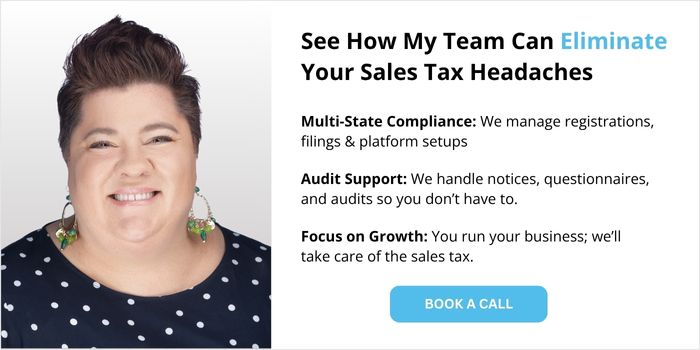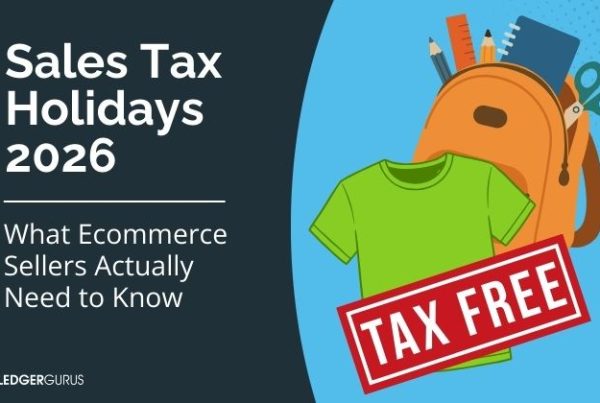Are you feeling anxious about sales tax liabilities you may have overlooked in the past?
You’re not alone.
As states get tougher and more aggressive with enforcement, many ecommerce businesses find themselves in this position, unsure of how to fix the problem without getting hit with steep penalties or triggering an audit.

Realizing that you’ve missed collecting or remitting sales tax can be overwhelming, but there is good news: a Voluntary Disclosure Agreement (or VDA) may be just what you need. This agreement offers a way to clear up your past liabilities and get compliant.
In this guide, we’ll explain how a VDA works and how it can help you take control of your sales tax situation with confidence.
We’ll cover:
- What is a Voluntary Disclosure Agreement (VDA)?
- How do VDAs protect your ecommerce business?
- How do I know if my business is eligible for a VDA?
- How does the VDA process work?
- When should I consider a VDA?
- What are the pros and cons of a VDA?
- How to get help with a VDA
Let’s get into it.

Key Takeaways
- A Voluntary Disclosure Agreement (VDA) allows ecommerce businesses to disclose unpaid sales taxes voluntarily, helping you avoid hefty penalties and audits.
- VDAs usually offer reduced penalties and a shorter look-back period of 3-4 years. This provides significant cost savings compared to getting audited.
- To qualify for a VDA, your business needs to meet certain eligibility requirements, including voluntary disclosure and not having any prior contact with the state.
- The VDA process involves reaching out to the state, negotiating the terms, paying back taxes, and staying compliant with state sales tax laws going forward.
- It’s a good idea to consult with an ecommerce sales tax expert to guide you through the VDA process and help you steer clear of any potential mistakes.
For an overview, watch our video.
What is a Voluntary Disclosure Agreement (VDA)?
A Voluntary Disclosure Agreement (VDA) is a legal agreement between an ecommerce business and a state tax authority.
This agreement is helpful to ecommerce sellers if you haven’t been collecting or remitting sales tax when you should have been.
It allows you to voluntarily come forward about previously unpaid or unreported taxes in exchange for certain benefits, like avoiding the harsher consequences of an audit or the state forcing you to comply.
How Do VDAs Protect Your Ecommerce Business?
Here are a few benefits your ecommerce business can gain from engaging in a Voluntary Disclosure Agreement:
- Reduced penalties
- Limited look-back period
- Audit protection
- Peace of mind
Reduced Penalties
One of the biggest perks of a VDA is getting those penalties lowered.
States often impose hefty penalties on businesses for not following ecommerce sales tax laws, but they’re usually willing to work with you if you come forward on your own.
With a VDA, you can see those penalties substantially reduced – or even wiped out entirely in some cases.
Limited Look-Back Period
When you enter a VDA, the state usually limits how far back they’ll go when looking at your sales. This means they’ll only require you to provide sales information and pay back sales tax for a certain number of years – typically 3-4 years, depending on the state.
On the other hand, if the state finds you on their own and audits you, they can go back as far as 8-10 years!
VDAs are a great way to cut down how much of your past sales they’ll scrutinize.
They are an especially valuable tool to reduce periods of past exposure.
This is a big deal if your business has a physical presence in the state because, without a VDA, there’s no limit on how far back they can audit you.
On the other hand, since economic nexus didn’t exist before the Wayfair decision in 2018, the audit window is more predictable and is shorter.
For more information on physical and economic nexus, read our Complete Guide to Sales Tax Nexus for eCommerce Sellers.
We also talk about it in depth in our 10 Steps to Ensure Sales Tax Doesn’t Burn Down Your Ecommerce Business download, along with what you need to do to stay compliant. It also has a list of all the economic nexus thresholds by state. You can download that here:
Audit Protection
By voluntarily disclosing your past tax liabilities, your business can reduce the risk and headache of a sales tax audit, which can be both time-consuming and expensive.
As mentioned earlier, when your ecommerce business gets audited, states can dig back as far as they want – sometimes even 8-10 years.
Plus, we’re seeing more states teaming up on these audits, asking sellers to provide information about sales in neighboring states, which can increase the risk of getting audited in even more states.
One important thing to keep in mind: once the state begins their audit, it’s too late to do a VDA. So, it’s better to act sooner rather than later.
Peace of Mind
A VDA brings your ecommerce business into full compliance, giving you the peace of mind that comes from knowing you’ve cleared up any past liability risks.
How Do I Know If My Ecommerce Business Is Eligible For a VDA?
Not every ecommerce business qualifies for a Voluntary Disclosure Agreement. Eligibility can vary by state, but common requirements include:
- Voluntary disclosure: The key to a VDA is that it has to be voluntary. If your ecommerce business is already under audit or investigation by the state, you are not eligible to participate in a VDA.
- Good faith effort: Your business needs to show that it’s making a genuine effort to comply with state sales tax laws moving forward.
- NO PRIOR CONTACT: Your ecommerce business must not have had any prior contact with the state before starting the VDA process.
No prior contact means that you can’t already be registered for remitting sales tax. Once you register or are audited, you are no longer eligible for a VDA.
Also, if you have ever received a letter, email, or phone call from a state – even if you didn’t respond – you are out of luck for a VDA.
How Does the VDA Process Work?

- Initial Contact: Each state handles VDAs differently. Some will have you start by filling out a specific VDA form, or writing a letter to be emailed or faxed, and submitting it to the state.
- Negotiation: Once you’ve made initial contact with the state, your business will negotiate the terms of the VDA. This includes agreeing on the look-back period, penalties, and interest. At this point, you can start collecting sales tax in the state to stop any further liabilities from piling up.
- Payment of back taxes: Once the VDA is approved, you’ll need to pay the agreed-upon back taxes, along with any reduced penalties and interest that were negotiated.
- Ongoing compliance: After the VDA is finalized, it’s important that you remain compliant with state tax laws to avoid any future penalties.
How Long Does It Take to Process a VDA?
The time it takes to process a Voluntary Disclosure Agreement can vary depending on the state and the complexity of your tax situation.
We are seeing VDAs take anywhere from three months to a year to complete.
When Should I Consider a VDA?
Deciding whether to enter into a Voluntary Disclosure Agreement (VDA) is a big decision.
If you are an ecommerce seller, there are certain circumstances when a VDA might be worth considering.
- You have crossed nexus thresholds: If you know you’ve crossed nexus thresholds in the past but didn’t register and start remitting when you should have, a VDA can help you get compliant.
- You have a significant back tax liability: Take a look at the amount of back tax liability your business has in each state. If it’s substantial, a VDA could be a smart move to address this liability while keeping penalties to a minimum.
- You’re concerned about the risk of an audit: If your business is at risk of a state audit due to non-compliance, entering into a VDA can help reduce that risk. Don’t forget – if one state audits you, they are likely in cahoots with neighboring states. Do you have tax liability in those neighboring states that could come into play if you were audited?
- You have weighed the costs: Finally, compare the penalties and interest you could face if you were audited against the potential cost savings you could have through a VDA.
Please note, if you receive communication from the state, including a pre-audit questionnaire, your option of doing a VDA is gone.
Don’t wait!
The important thing here is to be proactive.
What are Some Pros and Cons of Entering into a VDA?
While we strongly believe that VDAs are a valuable option for businesses looking to solve their past sales tax liabilities, they are not for everyone.
Here are some things to consider:
Pros of doing a VDA:
- Significant cost savings: By reducing penalties and limiting the look-back period, a VDA can save your business a lot of money.
- Audit protection: A Voluntary Disclosure Agreement can protect your business from the hassle and expense of a state audit.
- Sales tax exposure: Consider where you have sales tax exposure. If the potential sales tax penalty is higher than the professional fees charged for the VDA, it makes sense to go ahead with it.
- Compliance and peace of mind: Getting your business in line with state sales tax laws not only reduces future risks but also gives you peace of mind.
Cons of doing a VDA:
- Low sales tax exposure: If the potential sales tax penalty is NOT more than the professional fees to do a VDA, it makes more sense to register and pay the penalties, interest, and back taxes.
- Financial commitment: Even with reduced penalties, your business will still need to pay back taxes, which can be a significant financial commitment.
- Ongoing compliance: After you’ve entered into a VDA, your business must stay compliant with state sales tax laws, which may require additional resources.
- Potential for mistakes: Navigating the VDA process can be tricky, and mistakes or misunderstandings could lead to problems. Working with an ecommerce sales tax expert can help you avoid these pitfalls.
How to Get Help with a Voluntary Disclosure Agreement
If you’re struggling with past sales tax obligations, now’s the time to take action. Every delay is increasing risk and potential costs.
With the right approach, you can steer your business away from potential audits and into solid sales tax compliance.
But this can be confusing if you try to do it on your own.
Here at LedgerGurus, we have a team of sales tax experts that know all the ins and outs to not only guide you through the VDA process, but also to manage it for you so you can stay hands-off.
If you need help with a VDA or any other sales tax issues, get in touch with us here.
Other Resources
We recently did a webinar on why sales tax compliance is so important, and we went into quite a lot of detail about VDAs, including why or why not they may be a good fit for your business. You can access that webinar on demand here.
We also put together a list of 8 things you need to be paying attention to with your sales tax in order to be compliant. You can access the video here:






